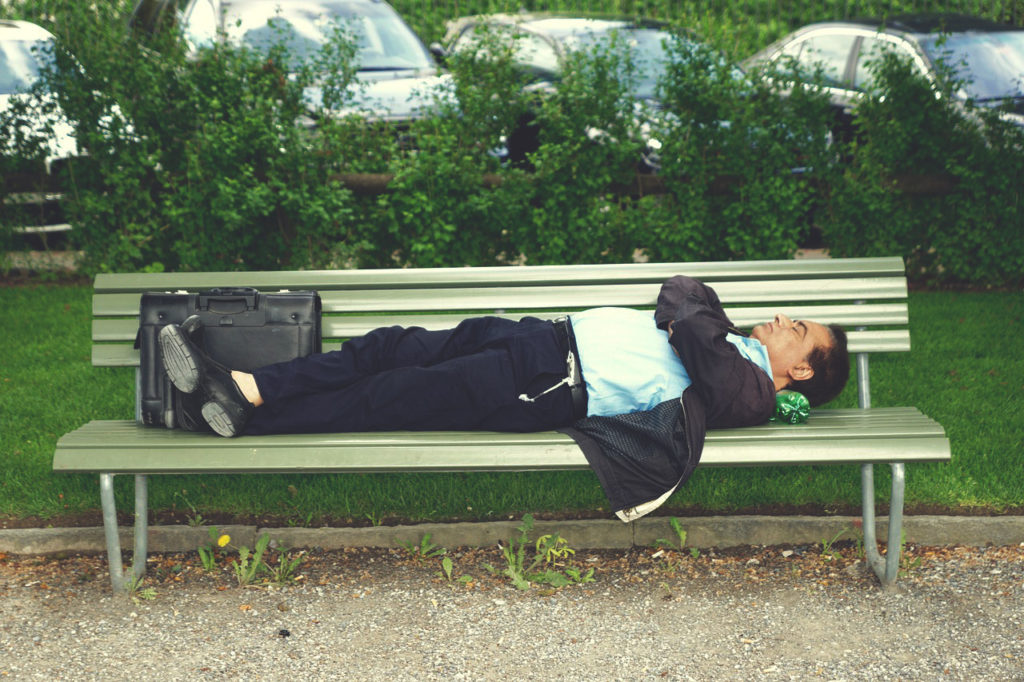Sleep problems don’t usually get triggered for no reason – they’re usually caused by an identifiable event or source, for example: work stress, going away to college, an injury, or a new baby. Similarly, sleep problems don’t usually stick around for no reason, either – that also has a cause. In other words, there are identifiable factors that perpetuate the sleep problems, and targeting these is an important part of getting your sleep back on track.
If you know a little bit about CBT-I, or if you’ve read my insomnia guide, you’ll know that this approach is part of a “behavioral” understanding of insomnia. Research shows that a behavioral treatment approach is extremely effective – in fact, more effective than medications in the long term – which is why CBT-I is widely recommended as the first line treatment for insomnia.
From my experience treating insomnia, here are the most common coping behaviors that clients have adopted in order to manage their sleep problems which actually further perpetuate the insomnia.
1. Getting into bed earlier.
The thinking goes like this, “If it’s taking me 1 to 2 hours to fall asleep, I should be getting into bed at least 1 to 2 hours earlier so I can get the same amount of sleep.” Seems to make sense. If you’re in bed, even if you’re not sleeping, at least you’re resting, right?
The problem with this is that the more time you spend awake in bed, the more you are training yourself to use the bed for ‘awake time’ instead of sleep. Are you getting some physical rest? Sure. But your brain is not only actively conditioning itself to be awake in bed, it’s more likely to be frustrated, irritated, or anxious due to the fact that you’re not able to fall asleep.
2. Trying to “catch up” on sleep.
This one is a bit tricky to detect because it actually works, in the short term, at least. If you’ve had a terrible night of sleep, or been a bit sleep deprived over the week, it feels good to sleep in to make up for the lost sleep. Or you may be compelled to take a mid-day nap or crash early after a particularly tired day.
However, as a long term strategy, it is actually counterproductive to fixing your sleep problems. These kinds of sleep “catch up” behaviors further reinforce poor sleep by becoming crutches you start to depend upon, consciously or subconsciously. They throw off your daily/weekly sleep patterns, and can cause even further disrupted sleep.
3. Doing more things in bed.
First it might start with reading a book in bed because you heard that it can help you get sleepy. When that stops working it might be the TV to help pass the time and also provide background noise that might help you sleep. Then it might be browsing Facebook or watching YouTube videos as you lie in bed because, well, you’re bored and your smartphone is irresistible. If you can’t sleep, you might as well be entertained, right?
These behaviors are extremely common, and also are extremely common reasons for disrupted sleep. If you are engaging in activities in bed other than sleeping or being sleepy, you are weakening the association your brain has between bed and sleep, and strengthening the association between bed and being awake. Which means it makes it more likely that being in the bed will trigger wakefulness instead of sleepiness the next time you get into bed.
4. Using alcohol, Benadryl, or other sleep aids.
Faced with repeated nights of difficulty falling asleep or poor sleep, who wouldn’t consider turning to sleep aids, meds, or substances to help? Let me be clear that I don’t have any problems with using sleep aids or meds as a short term strategy to deal with acute insomnia. This can be effective and helpful. The problem is that these are not good long term strategies to deal with insomnia.
You probably don’t have to think very hard to understand why drinking alcohol every night to help you fall asleep would be a poor long term strategy. After drinking every night for years, you may find yourself with problems in your life that are greater than insomnia. Plus, even in the short term, while alcohol does help you achieve sleep onset faster, it causes shallower and more fragmented sleep over the course of the night, leaving you worse off.
Benadryl, over-the-counter sleep aids, and prescription sleep meds also have a long term problem. Because they don’t fix the root of the insomnia, the sleep problems are likely to return after you stop using them, if you haven’t changed any sleep behaviors. Sleep aids/meds can cause side effects and affect your sleep architecture (the stages of sleep). Additionally, long term sleep med use commonly results in either dependence or tolerance to the medication.
5. Reducing overall activity level
People with chronic insomnia start to find themselves defined – and limited – by their sleep problems. It is common for an insomnia sufferer to start to reduce their activity level and try to expend less energy as a way to cope with poor sleep. They might favor less vigorous physical activities, decrease the frequency of workouts, go out less, and generally make decisions through the lens of always feeling tired and having low energy because of their insomnia. This shift might even be unconscious.
The first problem with this way of coping is that it feeds into your negative thoughts and beliefs about your sleep problems, which drive a vicious cycle of anxiety and unhealthy focus on the symptoms – which in turn negatively impact sleep. It’s kind of like a self-fulfilling prophecy, one that’s likely to lead to further reduction of activity and more negative cognitions.
Secondly, there is evidence to suggest that reducing your level of activity and exercise can perpetuate insomnia at the physiological level. Research is clear that exercising on a regular basis leads to improved sleep and decreased insomnia symptoms. Regular exercise is one of the most common recommendations on ‘sleep hygiene’ guidelines. By adopting a mindset that causes you to avoid regular moderate-intensity exercise, you are giving up an effective method of combating insomnia.
One of the core foundations that Cognitive Behavioral Therapy for Insomnia is built on is the understanding that chronic insomnia is enabled by ‘perpetuating factors’ – behaviors like the ones described above, which may be well-intentioned but ultimately counter-productive – and that fixing these issues actually gets to the root of the insomnia and restores healthy sleep. If you find yourself identifying with one or more of the behaviors identified above, I highly encourage you to experiment by addressing those issues as well as setting aside some time to go through a sleep training period. Just like the insomnia perpetuating factors took time to develop and get reinforced, unlearning those behaviors will also take some time as well as hard work. However, if improving your sleep is an important goal of yours, you will find that it is well worth your effort.


